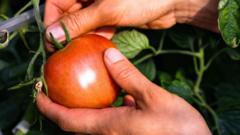A BBC investigation reveals that several UK supermarkets' Italian tomato purees likely contain tomatoes sourced from China, where forced labor practices are rampant.
**Shocking Findings Reveal UK Supermarkets' Italian Tomato Purees May Contain Forced-Labour Tomatoes from China**

**Shocking Findings Reveal UK Supermarkets' Italian Tomato Purees May Contain Forced-Labour Tomatoes from China**
Investigative report uncovers links between UK tomato products and human rights abuses in Xinjiang.
In a startling revelation, a BBC investigation has uncovered that several “Italian” tomato purees found in UK supermarkets may contain tomatoes sourced from China’s Xinjiang region, known for its human rights violations and allegations of forced labor. This troubling discovery raises significant ethical and environmental concerns about supply chain transparency in the food industry.
Among the products implicated are supermarket own-brands such as Tesco’s “Italian Tomato Purée” and Waitrose’s “Essential Tomato Purée.” A total of 17 products tested, predominantly own-brands in UK and German retailers, were found to likely contain Chinese tomatoes. This troubling revelation comes amidst ongoing scrutiny of labor practices in Xinjiang, where UN reports allege that over a million Uyghurs and other Muslim minorities have been detained and subjected to forced labor since 2017.
Chinese officials reject these claims, asserting that labor rights are protected under their laws. Nonetheless, investigative evidence gathered by the BBC paints a disturbing picture. Interviews with individuals who experienced or observed forced labor in Xinjiang’s agricultural sector reveal appalling conditions of intimidation and abuse. Reportedly, workers are coerced into meeting rigorous quotas under threat of violence, including electric shocks.
The investigation utilized shipping data and testing methodologies to trace the origins of the tomatoes, concluding that a significant portion is shipped to European processors like the Italian firm Antonio Petti, which produced many products sold as ‘Italian’. While some supermarkets responded forcefully by conducting their own investigations and refuting the allegations, others like Lidl admitted to briefly using Chinese tomatoes due to supply chain issues.
The BBC's findings extend to undercover footage revealing that Petti’s managers acknowledged the use of Chinese tomatoes to a potential client, despite public denials. The situation is exacerbated by Europe’s permissive approach to self-regulation in supply chains, which makes it challenging to ensure that products are free from forced labor practices.
As the European Union moves toward stronger regulations in this area, NGO representatives warn that the UK could become a target for companies seeking to bypass stringent labor standards. Experts urge consumers to dig deeper into the true costs of their food, questioning the origins and the ethical implications of their purchases.
Ultimately, this investigation underscores the urgent need for robust supply chain regulations in the UK and across Europe to prevent human rights abuses from infiltrating consumer shelves. The call for systemic change highlights the role of consumers, corporations, and policymakers in advocating for a transparent and ethically sourced food system.
Among the products implicated are supermarket own-brands such as Tesco’s “Italian Tomato Purée” and Waitrose’s “Essential Tomato Purée.” A total of 17 products tested, predominantly own-brands in UK and German retailers, were found to likely contain Chinese tomatoes. This troubling revelation comes amidst ongoing scrutiny of labor practices in Xinjiang, where UN reports allege that over a million Uyghurs and other Muslim minorities have been detained and subjected to forced labor since 2017.
Chinese officials reject these claims, asserting that labor rights are protected under their laws. Nonetheless, investigative evidence gathered by the BBC paints a disturbing picture. Interviews with individuals who experienced or observed forced labor in Xinjiang’s agricultural sector reveal appalling conditions of intimidation and abuse. Reportedly, workers are coerced into meeting rigorous quotas under threat of violence, including electric shocks.
The investigation utilized shipping data and testing methodologies to trace the origins of the tomatoes, concluding that a significant portion is shipped to European processors like the Italian firm Antonio Petti, which produced many products sold as ‘Italian’. While some supermarkets responded forcefully by conducting their own investigations and refuting the allegations, others like Lidl admitted to briefly using Chinese tomatoes due to supply chain issues.
The BBC's findings extend to undercover footage revealing that Petti’s managers acknowledged the use of Chinese tomatoes to a potential client, despite public denials. The situation is exacerbated by Europe’s permissive approach to self-regulation in supply chains, which makes it challenging to ensure that products are free from forced labor practices.
As the European Union moves toward stronger regulations in this area, NGO representatives warn that the UK could become a target for companies seeking to bypass stringent labor standards. Experts urge consumers to dig deeper into the true costs of their food, questioning the origins and the ethical implications of their purchases.
Ultimately, this investigation underscores the urgent need for robust supply chain regulations in the UK and across Europe to prevent human rights abuses from infiltrating consumer shelves. The call for systemic change highlights the role of consumers, corporations, and policymakers in advocating for a transparent and ethically sourced food system.

















